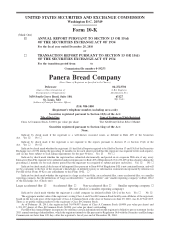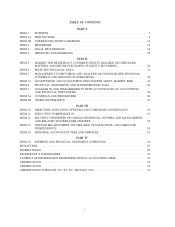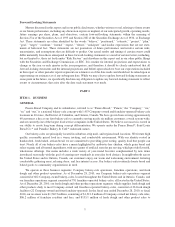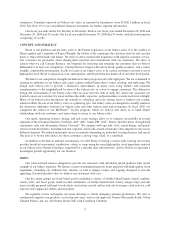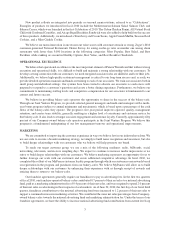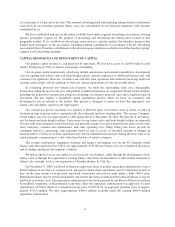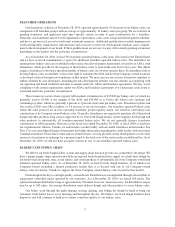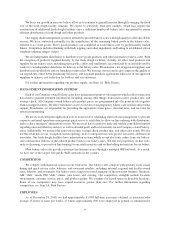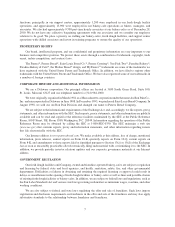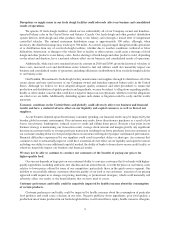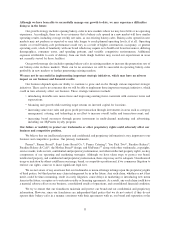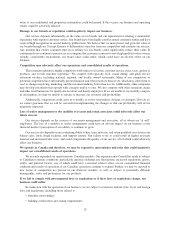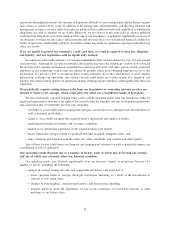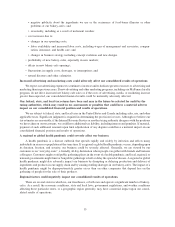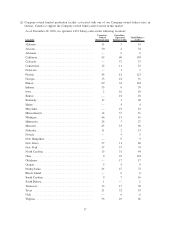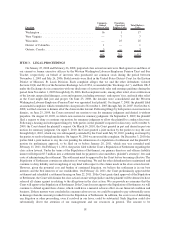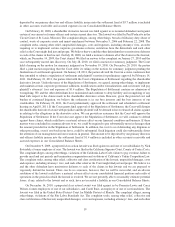Panera Bread 2010 Annual Report Download - page 16
Download and view the complete annual report
Please find page 16 of the 2010 Panera Bread annual report below. You can navigate through the pages in the report by either clicking on the pages listed below, or by using the keyword search tool below to find specific information within the annual report.Disruptions or supply issues in our fresh dough facilities could adversely affect our business and consolidated
results of operations.
We operate 22 fresh dough facilities, which service substantially all of our Company-owned and franchise-
operated bakery-cafes in the United States and Ontario, Canada. Our fresh dough and other product distribution
system delivers fresh dough and other products daily to the bakery-cafes through a leased fleet of temperature
controlled vehicles. The optimal maximum distribution range is approximately 300 miles; although, when
necessary, the distribution range may reach up to 500 miles. As a result, any prolonged disruption in the operations
of or distribution from any of our fresh dough facilities, whether due to weather conditions, technical or labor
difficulties, destruction, or damage to the vehicle fleet or facility or other reasons, could cause a shortage of fresh
dough and other products at our bakery-cafes. Such a shortage of fresh dough and other products could, depending
on the extent and duration, have a material adverse effect on our business and consolidated results of operations.
Additionally, while fuel costs remained relatively constant in 2010 and 2009, given the historical volatility of
these costs, increased costs and distribution issues related to fuel and utilities could also materially impact our
business and consolidated results of operations, including efficiencies in distribution from our fresh dough facilities
to our bakery-cafes.
Our Franklin, Massachusetts fresh dough facility manufactures and supplies through its distributors all of the
cream cheese and tuna used in most of our Company-owned and franchise-operated bakery-cafes in the United
States. Although we believe we have adopted adequate quality assurance and other procedures to ensure the
production and distribution of quality products and ingredients, we may be subject to allegations regarding quality,
health, or other similar concerns that could have a negative impact on our operations, whether or not the allegations
are valid or we are liable. Additionally, defending against such claims or litigation could be costly and the results
uncertain.
Economic conditions in the United States and globally could adversely affect our business and financial
results and have a material adverse effect on our liquidity and capital resources as well as that of our
suppliers.
As our business depends upon discretionary consumer spending, our financial results may be impacted by the
broader global economic environment. Our customers may make fewer discretionary purchases as a result of job
losses, foreclosures, bankruptcies, reduced access to credit and falling home prices. Because a key point in our
business strategy is maintaining our transaction count, average check amount and margin growth, any significant
decrease in customer traffic or average profit per transaction resulting from fewer purchases from our customers or
our customers trading down to lower priced products on our menu will negatively impact our financial performance.
Financial difficulties experienced by our suppliers could result in product delays or shortages. An economy that
continues to fail to substantially improve could have a material adverse effect on our liquidity and capital resources
including our ability to raise additional capital if needed, the ability of banks to honor draws on our credit facility, or
otherwise negatively impact our business and financial results.
We may not be able to continue to convince our customers of the benefits of paying our prices for
higher-quality food.
Our success depends in large part on our continued ability to convince customers that food made with higher-
quality ingredients, including antibiotic-free chicken and our artisan breads, is worth the prices at our bakery-cafes
relative to lower prices offered by some of our competitors, particularly those in the quick-service segment. Our
inability to successfully educate customers about the quality of our food or our customers’ rejection of our pricing
approach could require us to change our pricing, marketing, or promotional strategies, which could materially and
adversely affect our results or the brand identity that we have tried to create.
Customer preferences and traffic could be negatively impacted by health concerns about the consumption
of certain products.
Customer preferences and traffic could be impacted by health concerns about the consumption of particular
food products and could cause a decline in our sales. Negative publicity about ingredients, poor food quality, a
production run of items produced in our fresh dough facilities, food-borne illness, injury, health concerns, allergens,
9


